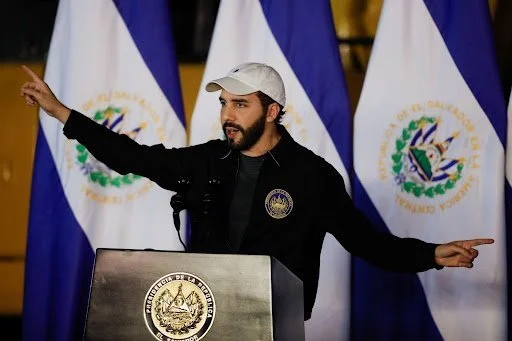El Salvador Declares a State of Emergency
A police officer patrols La Libertad square in San Salvador on March 29 after El Salvador's Congress declared a state of emergency. On Sunday, some constitutional protections were temporarily suspended after the Central American country recorded a sharp rise in killings attributed to criminal gangs. Photo: Jose Cabezas/ Reuters
El Salvador announced a state of emergency for thirty days in response to a dramatic uptick in homicides over the last weekend. Fourteen people were killed on Friday, and another 62 died on Saturday, the highest number in decades. President Nayib Bukele requested the state of emergency that day, and by nighttime the Legislative Assembly had approved it with 67 out of 84 votes. The policy is supposed to give the government the power to crack down on gang violence, the cause of recent deaths.
El Salvador’s past has been marked by decades of gang violence. The two main gangs in the country, MS-13 and Barrio 18, have around 70,000 members total. They have been involved in murder, extortion, and drug trafficking. El Salvador has one of the highest homicide rates in the world, although it has decreased in recent years. In 2021, the country saw a 30-year low of 1,140 murders.
Unfortunately, this year’s rate is likely to see an increase. Bukele has attempted to lower that number by invoking Article 29 of the constitution, which allows a state of emergency under certain circumstances, such as war, catastrophe, or severe disturbances of the public order. This, in turn, allows a temporary suspension of certain constitutional rights, such as freedom of assembly, the right to a lawyer, the inviolability of communications, and the length of detention.
Human rights groups have spoken out against the opportunities for abuse made possible by the state of emergency. There have already been arrests without evidence, threats to punish prisoners for outside activity, and manipulation of judge decisions. Human Rights Watch’s Americas director, Tamara Taraciuk Broner, explains that “the government should address gang violence in El Salvador, but it should do it in a rights-respecting way. And instead of protecting the people through the state of emergency, which is extremely broad, they’re just putting their rights at risk and we see the consequences with these roundups.”
There has been an increase in police and military activity. In just a few days, around 2,500 alleged gang members were arrested, adding to the more than 16,000 already in jail. El Salvador’s armed forces have grown in both strength and aggression, especially since the authorization of the use of lethal force in 2020. Furthermore, there are concerns about prison conditions, as stories about lack of sanitation, overcrowding, and food shortages circulate. A recent increase in prison sentences, from the single digits to almost fifty years, is another sign of the government crackdown.
The president of El Salvador, Nayib Bukele, on Nov. 1, in San Salvador. Photo: Jose Cabezas/Reuters
President Bukele was elected in Feb. 2019, following a campaign against gang violence and established corruption. He has enjoyed a high approval rating, and is known for his presence on social media and a good coronavirus response. However, he has also been in multiple controversies and has been consolidating serious amounts of power.
There are no more independent democratic institutions in El Salvador. In 2020, Bukele used armed troops to force legislative approval for his budget. A year later, his New Ideas Party won the legislative elections, giving him a majority in the Legislative Assembly. He then dismissed the attorney general and five Supreme Court judges, filling the justice system with loyalists who then ruled in favor of allowing a second consecutive presidential term.
Without checks and balances, there is a concern for rising authoritarianism and the undermining of the separation of powers in the country. Bukele has aggressively pushed his administration into seizing power while at the same time promising to end the legacy of violence. While many international organizations and independent monitors cry foul at the human rights abuses, others are hoping that the president’s assertive policies will find success.


